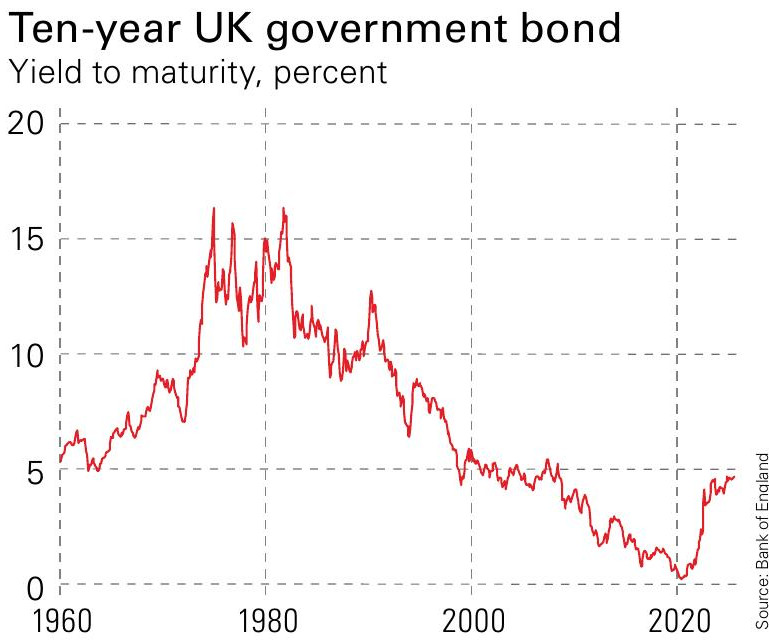The battle of the bond markets and public finances
An obsessive focus on short-term fiscal prudence is likely to create even greater risks in a few years, says Cris Sholto Heaton


Get the latest financial news, insights and expert analysis from our award-winning MoneyWeek team, to help you understand what really matters when it comes to your finances.
You are now subscribed
Your newsletter sign-up was successful
Want to add more newsletters?

Twice daily
MoneyWeek
Get the latest financial news, insights and expert analysis from our award-winning MoneyWeek team, to help you understand what really matters when it comes to your finances.

Four times a week
Look After My Bills
Sign up to our free money-saving newsletter, filled with the latest news and expert advice to help you find the best tips and deals for managing your bills. Start saving today!
Bond and equity investors are fundamentally in opposition. A bondholder cares only about receiving their interest and capital; anything that puts that in danger is bad. The ideal borrower might be one that takes your cash, parks it in ultra-safe assets to protect the principal and makes paying the coupons the only priority for its cash flow. There is no upside if the borrower takes risks. In fact, there is not even much value in long-term survival: the borrower can fail due to a lack of investment and the bondholder is still happy if they have been repaid in full.
On the other hand, equity – “the fine sliver of hope between assets and liabilities”, as Russell Napier calls it – hopes to profit from growth in earnings or assets. Shareholders want the company to take some kind of risk because they benefit if that risk pays off. If that might increase the chance that loans aren’t repaid, so be it.
This is well understood by markets. Nobody expects bondholders and shareholders to speak in each others’ interests. Yet when it comes to the public finances, that gets completely lost.
MoneyWeek
Subscribe to MoneyWeek today and get your first six magazine issues absolutely FREE

Sign up to Money Morning
Don't miss the latest investment and personal finances news, market analysis, plus money-saving tips with our free twice-daily newsletter
Don't miss the latest investment and personal finances news, market analysis, plus money-saving tips with our free twice-daily newsletter
All about the bonds
Today, we hear endless talk about why the chancellor needs to cut spending, raise taxes or both. Look at this through the bond-equity framework, and we can see that this is framed in bondholders’ terms: it’s all about making them feel more secure. The discussion rarely touches on whether borrowing is rising because of current expenditure or long-term investment.
Bond investors could make a very valuable intervention by signalling that borrowing to invest in the infrastructure that Britain needs (with a well-costed plan) would be seen very differently from borrowing to fund profligate current expenditure. Yet most talking points simply boil down to “large deficit = bad”.

This reasoning gets stretched into some bizarre pretzel logic. Raising taxes will slow growth since disposable income will be reduced, we are told approvingly. That may curb inflation and allow interest rates to be lowered, which is good for bonds. Yet the idea that anybody else would want weaker growth in an economy that is clearly not overheating is frankly unhinged.
Equity holders in this scenario are everybody who benefits from a stronger economy and more investment. And this is where long-term consequences of the current mindset look so worrying. Consider the visible deterioration in physical and social infrastructure in Britain. Failure to fix this because the government is cowed by the self-important bond vigilantes will open the door further to populist parties.
At present, UK 10-year gilts yield 4.4%. This is not high by past standards: it only feels high because of 15 years of ultra-low rate policy. True, it is high enough that rising interest costs puts even more strain on public finances, which makes the challenge even greater. But what compensation does it offer for, say, the inflationary risk of a future government in five years’ time with a populist mandate to spend and willingness to be radical? Very little.
This article was first published in MoneyWeek's magazine. Enjoy exclusive early access to news, opinion and analysis from our team of financial experts with a MoneyWeek subscription.
Get the latest financial news, insights and expert analysis from our award-winning MoneyWeek team, to help you understand what really matters when it comes to your finances.

Cris Sholt Heaton is the contributing editor for MoneyWeek.
He is an investment analyst and writer who has been contributing to MoneyWeek since 2006 and was managing editor of the magazine between 2016 and 2018. He is experienced in covering international investing, believing many investors still focus too much on their home markets and that it pays to take advantage of all the opportunities the world offers.
He often writes about Asian equities, international income and global asset allocation.
-
 Properties for sale with beautiful kitchens
Properties for sale with beautiful kitchensThe best properties for sale with beautiful kitchens – from a Modernist house moments from the River Thames in Chiswick, to a 19th-century Italian house in Florence
-
 Can US small caps survive the software selloff?
Can US small caps survive the software selloff?US stocks have made their worst start to a year since 1995 relative to a global benchmark. But experts think some sectors of the market are still worth buying.
-
 8 of the best properties for sale with beautiful kitchens
8 of the best properties for sale with beautiful kitchensThe best properties for sale with beautiful kitchens – from a Modernist house moments from the River Thames in Chiswick, to a 19th-century Italian house in Florence
-
 Three key winners from the AI boom and beyond
Three key winners from the AI boom and beyondJames Harries of the Trojan Global Income Fund picks three promising stocks that transcend the hype of the AI boom
-
 RTX Corporation is a strong player in a growth market
RTX Corporation is a strong player in a growth marketRTX Corporation’s order backlog means investors can look forward to years of rising profits
-
 Profit from MSCI – the backbone of finance
Profit from MSCI – the backbone of financeAs an index provider, MSCI is a key part of the global financial system. Its shares look cheap
-
 "Botched" Brexit: should Britain rejoin the EU?
"Botched" Brexit: should Britain rejoin the EU?Brexit did not go perfectly nor disastrously. It’s not worth continuing the fight over the issue, says Julian Jessop
-
 'AI is the real deal – it will change our world in more ways than we can imagine'
'AI is the real deal – it will change our world in more ways than we can imagine'Interview Rob Arnott of Research Affiliates talks to Andrew Van Sickle about the AI bubble, the impact of tariffs on inflation and the outlook for gold and China
-
 Should investors join the rush for venture-capital trusts?
Should investors join the rush for venture-capital trusts?Opinion Investors hoping to buy into venture-capital trusts before the end of the tax year may need to move quickly, says David Prosser
-
 Food and drinks giants seek an image makeover – here's what they're doing
Food and drinks giants seek an image makeover – here's what they're doingThe global food and drink industry is having to change pace to retain its famous appeal for defensive investors. Who will be the winners?